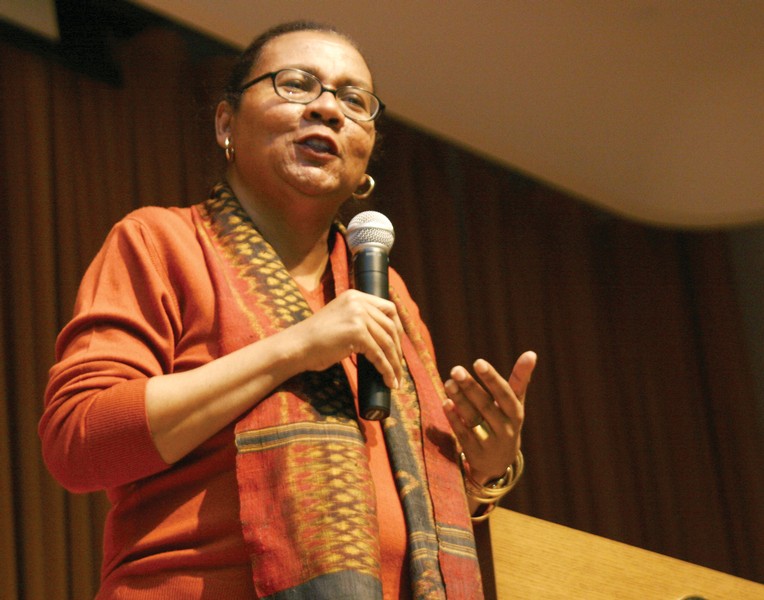Serendip is an independent site partnering with faculty at multiple colleges and universities around the world. Happy exploring!
Notes Towards Day 8 (Thurs, Sept. 22): How Free Is Our Speech?

On "what it looks like" to co-create a class....
I. coursekeeping
naming some more...
how useful were your writing partnerships? in what ways/not??
talking about the usefulness of frustration?
(cf. Tough's NYTimes article --> failure--> success;
also Dewey on doubting as thinking!)
Friday evening, your 4th paper is due: revised using my comments, those of
your writing partner, perhaps also w/ a hand up from Dewey, Freire or hooks....
In your Sunday evening post, begin to explore
your evolving philosophy of education(al access):
Do you think that education "levels the playing field"?
Why? How? A reminder that this site can be used to
put up thoughts/reactions/related materials @ any time
(as I did w/ my video!)
for Tuesday, read an essay that begins to prepare us for
our trip to Parkway, by looking @ American urban education:
Pedro Noguera's 2003 “Finding Hope Among the Hopeless,”
from City Schools and the American Dream: Reclaiming the Promise of Public Education
II. We were just getting going in our discussion of Freire on Tuesday....
"The more students work at storing the deposits entrusted to them,
the less they develop the critical consciousness which would result
from their intervention in the world as transformers of that world" (p. 54) --
in your talking pairs (a way of keeping us truly dialogic!):
How is this akin (or not?) to the story that Dewey was telling?
Do you recognize yourself in it? How applicable to your life/
education is this pedagogy, originally evolved in work with illiterate/
radically disenfranchized Brazilian peasants?
What is "problem-posing education"? (p. 60)
How do you feel/what do you think about always starting w/ a "problem"?
(Alice Lesnick's story about two of her education students, who didn't
want to didn't want to study problems. They wanted to study life!)
"...affirms men and women as beings in the process of becoming --
as unfinished, uncompleted beings in and with a likewise unfinished reality ...
they are aware of their incompletion ... the very roots of education" (p. 65).
"accepts neither a 'well-behaved' present nor a predetermined future --
roots itself in the dynamic present and becomes revolutionary" (p. 65).
"they must perceive their state not as fated and unalterable, but merely
as limiting -- and therefore challenging ... susceptible of transformation" (p. 66).
What's your response to these descriptions of our shared activity?
"They become jointly responsible for a process in which all grow ....
critical co-investigators in dialogue" (pp. 61-2).
"Education as the practice of freedom ... denies that the world
exists as a reality apart from people. Authentic reflection considers ...
people in their relations with the world" (p. 62).
"No one can be authentically human while he prevents others from being so" (p. 66).
How do you feel/what do you think about being responsible
for others' education, and not just your own?
Peter Elbow: Freire "goes the Deweyian
tradition of 'learning-by-doing' one further,"
in his argument that the teacher must help "incomplete men"
in their quest for revolution against an oppressive social order -->
this is a much more radical social critique than Dewey's project
of preparing students to do the work of citizens in a democracy:
it involves renovating the whole system!
What's your reaction to being asked to take this on?
Is this what you came here for??
[Remember Shorris saying that "coming into possession of the faculty of
reflection and the skills of politics leads to a choice for the poor ...
they may chose to oppose the game itself ... who wants to run that risk?"]
 III. What does his student-teacher/ follower (?), bell hooks, do w/ these ideas?
III. What does his student-teacher/ follower (?), bell hooks, do w/ these ideas?
How does she apply/make them relevant to her situation--and ours??
What does she add to Freire's educational philosophy?
Take a minute to find a quote --or write out an idea that stood out to you --
in any way! -- in hooks' text. Discuss this passage with your partner.
Let's read out some of these, and discuss as a large group....
* revolutionary pedagogy of resistence in segregated schools
need for pleasure, fun, excitement in classroom: celebration!
p. 3: "School was the place of ecstasy--pleasure and danger. To be changed by ideas was pure pleasure. But to learn ideas that ran counter to values and beliefs learned at home was to place oneself at risk..."
* joy of students not accepting our guidance
abuse of freedom in class, to dwell on personal experience
university as haven for those unfit for social interaction
teach w/out reinforcing existing systems of domination
* feminist critique: powerful gift flawed
water that contains some dirt (to extract, and be nourished);
cf. luxurious 1st world waste of the impure
* bourgeoise class biases shape pedagogial process,
social etiquette in class: maintain order @ all cost
decorum, censoring undermines democratic exchange of ideas
oppressive silencing of middle-class life
shallow emphasis on coming-to-voice:
wrong belief in democratization of voice: equal time, equal value of all
p. 183: "the academic work process is essentially antagonistic to the working class"
IV. Listening to some of Kai Davis's spoken word poetry --
to highlight the issue of what language(s) we use "in class"
how might bell hooks' ideas about
decorum/censoring be helpful here....?


